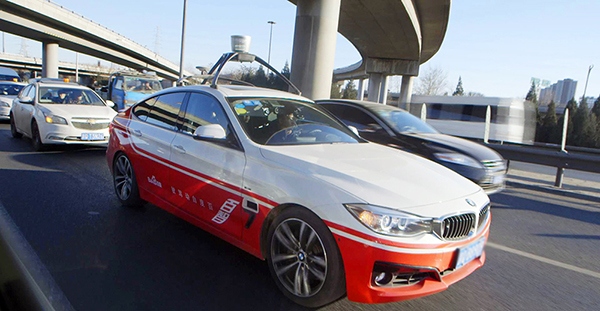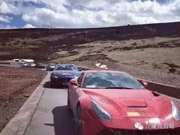


China's domestic self-driving cars, built to utilize the laser radar developed by Internet giant Baidu, will not cause accidents like Tesla's self-driving cards did in the U.S., promised Wang Jin, the senior vice president of the company.
Wang said in an interview with thepaper.cn that laser radars on Baidu's self-driving cars can identify obstacles using different colors, which means the cars can avoid accidents like the ones caused by Tesla cars. The number of sensors used on Baidu's self-driving cars is greater than that used on Tesla cars, said Wang. The sensors that Baidu uses are also more expensive than Tesla's.
Compared with Tesla, which uses a Combined Function Automation (Level 2) system, Baidu's self-driving cars will utilize a Full Self-Driving Automation (Level 4) system, according to Wang.
A man is dead after the Tesla Model S he was riding in crashed into a semi-truck on May 7, according to a report in The Guardian. The report noted that this was the first known death caused by a self-driving car.
Discussing the cause of the accident, Wang said that the cameras and millimeter wave radars on the Tesla car were not sufficient to identify all nearby obstacles. The millimeter wave radars were installed very low, meaning that they can only "see" about 5 degrees above the horizon. For that reason, the radar searched only beneath the truck and nothing was reflected back, Wang explained.
Wang said that the sensors used on Baidu's self-driving cars include laser radars as well as guided missile-class inertial navigation. Wang also said that the cars will be equipped with multiple millimeter wave radars, cameras and infrared sensors.
Baidu has said that self-driving cars are essentially movable computers. The company said that its self-driving cars have eight technical advantages; namely: computer vision, environmental sensing, planning and decision-making, operation control, sensor fusion, voice dialogue, high-precision positioning and a high-precision map.
The company plans to put its driverless vehicles into commercial use within three years and to achieve mass production within five.
The report on thepaper.cn said that each laser radar on Baidu's driverless vehicles costs 500,000 yuan, and the car-based system also costs a lot. "We hope to guarantee safety by using high-end devices as a first priority. Then we need to find a way to reduce the costs of those devices," said Wang.
Day|Week

 China's first intelligent security robot debuts in Chongqing
China's first intelligent security robot debuts in Chongqing A Total of 3,552 Subscribers Vanish In Two Days; YouTube Closes All Doors to Users’ Inquiries
A Total of 3,552 Subscribers Vanish In Two Days; YouTube Closes All Doors to Users’ Inquiries Out of this world! Futuristic UFO-shaped yacht has its own garden and a stunning underwater viewing deck
Out of this world! Futuristic UFO-shaped yacht has its own garden and a stunning underwater viewing deck An old tea house in Chengdu
An old tea house in Chengdu Furious Customer Crushes All the Buns from Vendor Just Because He Was Given the Wrong Flavor
Furious Customer Crushes All the Buns from Vendor Just Because He Was Given the Wrong Flavor 20 post-90s couples hold ’naked marriage‘ in E. China
20 post-90s couples hold ’naked marriage‘ in E. China Female official wearing traditional Han costume to promote local tourism
Female official wearing traditional Han costume to promote local tourism Over 12,000 Runners Seek Medical Care in S China’s Marathon
Over 12,000 Runners Seek Medical Care in S China’s Marathon Six Luxury Sports Cars Totaled after Fail Attempts to Cross China’s Most Perilous Highway Linking SW China’s Sichuan and Tibet
Six Luxury Sports Cars Totaled after Fail Attempts to Cross China’s Most Perilous Highway Linking SW China’s Sichuan and Tibet Incredible Transformation: “Witch Child”Whose Parents Left Him for Dead in Nigerian Makes Speedy Recovery
Incredible Transformation: “Witch Child”Whose Parents Left Him for Dead in Nigerian Makes Speedy Recovery